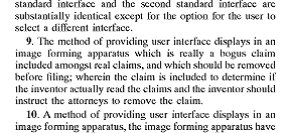OH WHAT A GIVEAWAY; ODA/RODA; REQUEST FOR HELP
Oh what a giveaway
 The IPKat's attention was drawn to this US patent application by his dynamic friend Colm MacKernan (Origin), who passed it on from a source who did not wish to be publicly acknowledged. The inventor is Atsushi Ishihara and the invention for which patent protection is claimed is a display control apparatus. Take a close look at Claim 9.
The IPKat's attention was drawn to this US patent application by his dynamic friend Colm MacKernan (Origin), who passed it on from a source who did not wish to be publicly acknowledged. The inventor is Atsushi Ishihara and the invention for which patent protection is claimed is a display control apparatus. Take a close look at Claim 9.
ODA/RODA
Last week the IPKat posted a note on the Court of First Instance ruling in ODA/RODA, a Community trade mark opposition decision that was available only in French and Spanish. Chris MacLeod (Hammonds) added a helpful note to explain what it was all about. The IPKat has since received the following from the UK Patents Office’s Dave Landau:
 Politician Lord Jenkins depicted (i) on the left, where he imagined himself to be and (ii) on the right, where his critics claimed he belonged.
Politician Lord Jenkins depicted (i) on the left, where he imagined himself to be and (ii) on the right, where his critics claimed he belonged.
In this context the IPKat recalls the late, great Lord Jenkins of Hillhead, who was the first Briton to become President of the European Commission. He was a man of immense intellect and talent but there was one achievement that lay beyond his vast capabilities: he was unable to pronounce his own forename. Apparently unable to pronounce the letter ‘r’, he turned it into a ‘w’ and called himself not Roy but Woy. Perhaps this is what the CFI had in mind when it spoke of the ability of the ‘o’ to absorb the letter ‘r’ that precedes it. Merpel adds, Roy’s manner of speech was once likened to “gargling in treacle”. How apt, given that ‘treacle’ is almost an anagram of ‘claret’ the good Lord’s favourite tipple.
Woy as a speech impediment here
Woy as an affectation here
 Request for help
Request for help
IPKat co-blogmeister Jeremy has in his possession an article with the joyously convoluted title “Where the Licensee’s ‘Obligation to Exploit’ Meets ‘the Licensor’s Best Advantage’: Say What You Mean and Mean What You Say”. Unfortunately this piece, which Jeremy printed out recently, doesn’t carry the name of an author or his/her affiliation. If anyone out there has any clue as to its source, can that kind person please post the information using the Comment facility below? Many thanks!
 The IPKat's attention was drawn to this US patent application by his dynamic friend Colm MacKernan (Origin), who passed it on from a source who did not wish to be publicly acknowledged. The inventor is Atsushi Ishihara and the invention for which patent protection is claimed is a display control apparatus. Take a close look at Claim 9.
The IPKat's attention was drawn to this US patent application by his dynamic friend Colm MacKernan (Origin), who passed it on from a source who did not wish to be publicly acknowledged. The inventor is Atsushi Ishihara and the invention for which patent protection is claimed is a display control apparatus. Take a close look at Claim 9.ODA/RODA
Last week the IPKat posted a note on the Court of First Instance ruling in ODA/RODA, a Community trade mark opposition decision that was available only in French and Spanish. Chris MacLeod (Hammonds) added a helpful note to explain what it was all about. The IPKat has since received the following from the UK Patents Office’s Dave Landau:
“… [P]arts of the reasoning may seem a little surprising. At the end of paragraph 52 the court states:
"It being a matter of word only marks, and being a matter of two short signs, the presence in the trade mark application of the sequence of three of the four letters that form the earlier mark, means that this sole difference between the signs in conflict constitutes a visual difference of little importance."
To some of us, small differences in short word marks do make a good deal of difference, especially when the difference is at the beginning of the marks.
English speakers might also be surprised by the comment in paragraph 55 that in the English language the vowel 'o' will have the propensity to absorb to a great extent the pronunciation of the letter 'r' that precedes it”.
In this context the IPKat recalls the late, great Lord Jenkins of Hillhead, who was the first Briton to become President of the European Commission. He was a man of immense intellect and talent but there was one achievement that lay beyond his vast capabilities: he was unable to pronounce his own forename. Apparently unable to pronounce the letter ‘r’, he turned it into a ‘w’ and called himself not Roy but Woy. Perhaps this is what the CFI had in mind when it spoke of the ability of the ‘o’ to absorb the letter ‘r’ that precedes it. Merpel adds, Roy’s manner of speech was once likened to “gargling in treacle”. How apt, given that ‘treacle’ is almost an anagram of ‘claret’ the good Lord’s favourite tipple.
Woy as a speech impediment here
Woy as an affectation here
IPKat co-blogmeister Jeremy has in his possession an article with the joyously convoluted title “Where the Licensee’s ‘Obligation to Exploit’ Meets ‘the Licensor’s Best Advantage’: Say What You Mean and Mean What You Say”. Unfortunately this piece, which Jeremy printed out recently, doesn’t carry the name of an author or his/her affiliation. If anyone out there has any clue as to its source, can that kind person please post the information using the Comment facility below? Many thanks!